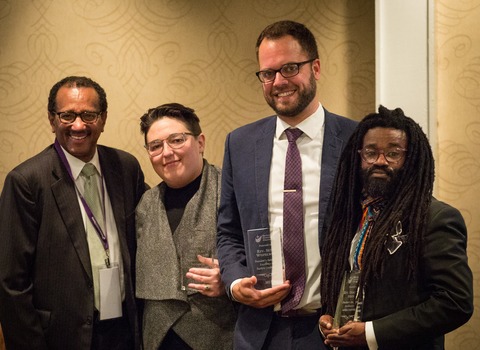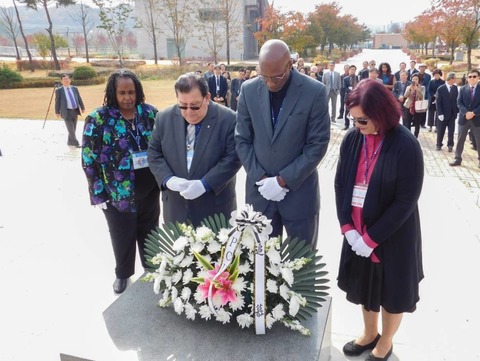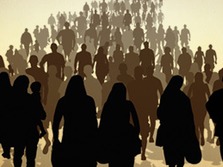|
|
From Jim: A Look Back at the Christian Unity Gathering
|
| Last week, 200 people gathered in Silver Spring, MD for the 4th Christian Unity Gathering of the National Council of Churches. Twenty-one seminary students from across the nation joined us and participated in an excellent all-day event on mass incarceration led by a team from the Children’s Defense Fund. At the same time, our Convening Tables gathered to coordinate work on interreligious dialogue, Christian education and formation, Faith and Order, and justice and advocacy.
Our time together had more highlights than I can adequately recount in this space. It was an enriching time together in which the NCC's expansive reach and vision became concrete and visible.
We held a book signing to celebrate the new volume of essays published by the Faith and Order Convening Table titled “Thinking Theologically About Mass Incarceration.” This is a significant contribution to the church’s understanding of the plague that is destroying our nation.
|
|
Bishop Darin Moore, the chair of the NCC Governing Board, preached a powerful sermon at our opening worship. The following morning, the entire gathering boarded buses headed for the new National Museum of African American History and Culture where we spent the morning.
In the afternoon, we held workshops on the racism, peace in the Middle East, and mass incarceration. The Christian Unity Gathering concluded with a gala banquet at which our keynote speaker was Ms. Vanita Gupta, chief executive of the Leadership Conference on Civil and Human Rights. We presented the J. Irwin Miller award for ecumenism to Dr. Iva Carruthers, leader of the Samuel DeWitt Proctor Conference and an award for interfaith excellence to Dr. Sayyid Syeed, the longtime guiding light of the Islamic Society of North America.
|
|  |
Additionally, we honored Rev. Osagyefo Sekou, Ms. Brittany Caine-Conley, and Rev. Seth Wispelwey for the courage and leadership they gave to the resistance in Charlottesville to the white nationalist march there this past summer.
Our Christian Unity Gathering dealt directly and forthrightly with challenging issues facing the church and the nation. Our theme was “Resistance, Resilience, and Persistence.” As I reflect on our time together, I can honestly say I left with a strengthened faith. I confess our time together was not for the faint of heart. While I cherished seeing old friends and for the laughter we shared together at times, I am grateful we did not for one second shy away from the enormous challenges we face.
The NCC Governing Board affirmed plans to move ahead with our racial justice truth-telling initiative, to be launched next April 3-4 with a massive gathering at the Lincoln Memorial and the National Mall. Please put those dates on your calendar. It will be a momentous occasion.
Know too that our next Christian Unity Gathering will take place October 15-17, 2018.
God has called us to make disciples of Jesus Christ for the transformation of the world, to break down the walls that divide us, and to be agents of peace. I give thanks that through the National Council of Churches, millions of Christians are working together to pursue these tasks.
|
| | | Jim Winkler
President and General Secretary |
| |  |
National Council of Churches Endorses Sweeping Initiative to End Racism
The governing board of the National Council of the Churches of Christ in the USA (NCC) enthusiastically endorsed a sweeping initiative to end racism. This process, beginning with a massive rally on the National Mall in Washington, DC on April 4, 2018, will unfold over several years and will be the most visible and impactful work of the National Council of Churches in its recent history.
Even as this work has been the goal of countless marches, rallies, and studies, this new effort by the NCC recognizes the urgency in this moment. The NCC now links arms with its vast alliance across the United States and territories in an initiative designed to discover and declare the complicity of the mainline church in perpetuating racism.
The first, most visible part of this effort will be a major event to take place on the National Mall on the fiftieth anniversary of the assassination of Rev. Dr. Martin Luther King, Jr., April 4, 2018. Connecting with events in Memphis and in other cities across the nation, the National Council of Churches will gather hundreds of thousands of people to remember the past and to launch a comprehensive effort, not unlike those that have unfolded in other parts of the world.
The NCC’s 38 member communions, a broad coalition of historically African American, Mainline Protestant, historic Peace Churches, and Orthodox Churches, will all be actively engaged in this project.
|
| | | American Baptist Home Mission Societies continues commitment to gun violence prevention
Continuing its commitment to gun violence prevention, American Baptist Home Mission Societies (ABHMS) has published an article in its November online edition of The Christian Citizen magazine and signed a letter to Congress written by Faiths United to Prevent Gun Violence.
Faiths United to Prevent Gun Violence sent the letter to Congress on Nov. 9 in response to the shooting deaths of 26 individuals during worship service on Nov. 5 at First Baptist Church, Sutherland Springs, Texas. According to news reports, victims ranged from an unborn baby to a 72-year-old parishioner.
Referring to the massacre as the “deadliest shooting at a house of worship in modern American history,” the letter calls on Congress to do the following...
|
| | | "You now bear a special moral responsibility"
Commentary by Rev. Roy Medley, past chair of NCC Governing Board
The moral weight for turning the tide of gun deaths in our country lies squarely on the shoulders of the churches in the South, Midwest, and West.
I say this for two reasons. First NRA-led resistance to sensible gun controls that have been offered in the wake of the deadly toll of the horrible tragedies we have endured as a people has been most strongly supported by voters and politicians from these regions.
Second, these regions are also by and large the ones where church attendance remains relatively high and church life is still fairly central in the life of the community.
Third, the voices of national church leaders advocating a reasoned approach to the issue have largely fallen on deaf ears. The voice of one’s own pastor and one’s own congregation on this moral issue carry by and large far more weight in shaping the minds of parishioners than any denominational voice can.
Until the voices of the churches in this area are heard not only mourning the deaths and praying for the bereaved but also waging a campaign for sensible gun reform, reasonable gun control measures will not happen. Consequently they shoulder the heavy moral burden of saving innocent lives through measures that would better screen buyers, take off the market military grade automatic weapons and kits like that used by the mass murderer in Las Vegas to turn his guns into weapons of mass destruction, and to ban those types of ammunition that are armor piercing.
The churches of mid-America, the South and West and their pastors hold positions of moral authority whose duty requires them to change the nature of this debate. It requires them to insert the ethical demands of love of neighbor and moral responsibility for the common good into the conversation about gun rights. The mantra of constitutional rights cannot efface the responsibility of determining how that right is ethically expressed in concern for others. Growing up I commonly heard the expression “your rights end at the tip of my nose” meaning no right was absolute; it had to be exercised in light of the rights of others. That is especially true now when the exercise of the right of gun ownership and the right to life itself are in conflict with one another. One pundit commented after Las Vegas that this was the price of freedom. How obscene!
So I now say to especially my Christian brothers and sisters who pastor and lead in these regions, you now bear a special moral responsibility for averting such future tragedies because the membership of your churches the key to unlock the stalemate that holds hostage reasonable gun control legislation. Without your voices, reasonable measures to balance the right of gun ownership with the right to life itself will not succeed and we shall continue to lurch from one episode of mass murders to another. And the weight of moral responsibility will lie upon those who refused to speak and act to end the slaughter.
|
| |  |
Pain of war lingers long after the violence ends
Members of a PC(USA) peace delegation visited No Gun Ri, 100 miles southeast of Seoul, on November 1, to seek reconciliation about the U.S. dismissal of the No Gun Ri massacre. (Photo by Kathy Melvin)
NO GUN RI, South Korea — War lives on in the pain of its survivors and their families long after the violence ends.
Members of a Presbyterian Church (U.S.A.) peace delegation saw the pain in the eyes of more than a dozen South Koreans who were forever changed by the impact of the massacre at No Gun Ri. During July 26-29, 1950, in the early days of the Korean War, South Korean refugees, mostly women and children were killed by a U.S. air attack and by small weapons fire by the U.S. 7th Calvary Regiment under the railroad bridge there. They were fired on from both ends of the tunnel for three days. Although estimates vary on the number of deaths, the peace foundation estimates between 250-300 people were killed.
The peace delegation traveled to South Korean November 1-8, in response to Overture 12-01 and Commissioner’s Resolution 12-13, adopted at the PC(USA) General Assembly 222 (2016) in Portland, focusing on the reunification of the Korean Peninsula and the need to build upon the increasing momentum toward peace.
|
| | |  |
A World Uprooted: Responding to Migrants, Refugees and Displaced People
FRIDAY, APRIL 20 – MONDAY, APRIL 23, 2018 DOUBLETREE BY HILTON, CRYSTAL CITY – WASHINGTON, D.C.,
ARMY-NAVY DR., ARLINGTON, VA.
We live in a time of upheaval and uprootedness – a world in which each year millions of people cross borders in search of more secure and sustainable lives, while white supremacist ideologies continue to impede the fight for justice and peace for all of God’s people. As we witness historically high levels of migration, we also find that racism, sexism, Islamophobia, xenophobia and other forms of discrimination are also on the rise in our communities and used for political gain. At the root of this global upheaval and migration are the push factors of violent conflict, climate change, and corruption which often intersect with one another. At a time when there is such need around the world, we grieve that the U.S. has greatly reduced its refugee admittance numbers while smaller, poorer countries are stepping up to welcome and provide refuge for those in need. As people of faith, we know we can do more. We believe God is with Dreamers, the migrant and the outcast and calls us to create places of sanctuary; to offer hospitality to the stranger, to welcome all – regardless of faith, race, gender or nationality – and to break down the dividing walls that separate us.
Ecumenical Advocacy Days 2018 will focus on the uprootedness of our world. We will analyze current policy and envision ways to more fully and justly respond to the global and local needs of displaced communities. Through prayer, worship, advocacy training, and networking, we will seek policy changes that advance hope and overcome the devastating impacts of conflict, climate change and corruption on God’s people.
|
| | | MESSAGE By His All-Holiness Ecumenical Patriarch Bartholomew to the UNFCCC COP-23 Session (Bonn, Germany, November 6-17, 2017)
The 23rd session of the United Nations Conference of the Parties on Climate Change provides occasion to recall with introspection and reflect with integrity on the state of our world, but also on where we have come and where we are headed as a global community, especially in light of the urgent call of the Paris Agreement.
Last November, our message to COP-22 was that we “hold nations accountable to resolutions reached or for violations incurred, especially as we know the intimate connections of climate change to global poverty, migration and unrest.”
This June, prior to the G-20 summit in Hamburg, we endorsed a letter inspired by Mission 2020 “calling on nations to highlight the importance of the 2020 climate turning point for greenhouse-gas emissions.”
On September 1st, the day when the Ecumenical Patriarchate first initiated – back in 1989 – a plea for prayers to protect God’s creation from human avarice, we co-signed a declaration with Pope Francis, affirming “that there can be no enduring resolution to climate change unless the response is concerted and collective.”
This year, our annual pastoral letter to Orthodox faithful worldwide expressed “our consternation that, while it is clear that the ecological crisis is constantly escalating in the name of growth and development, humanity remains oblivious to the global appeals for radical change in our attitudes toward creation.”
|
| | |
|
| Ecumenical Opportunities:
The Friends Committee on National Legislation (FCNL) is seeking an Assistant to the Executive Secretary (CEO): This person will report directly to the Executive Secretary and will be responsible for managing the Executive Secretary’s schedule and travel arrangements, managing incoming communications for the Executive Secretary, preparing and editing correspondence and other written materials, preparing financial reports, gathering information for the Executive Secretary, and staffing the FCNL Executive Committee and Education Fund Board.
The WSCF seeks a regional staff person with a vision for nurturing dynamic ecumenical student movements in the US and Canada; committed to social justice; and desiring to work as part of an international team on global student concerns. This role will be under a 2-year contract with the opportunity to renew for a maximum of 8 years. Salary and Benefits are negotiable.
|
| | Serving as a leading voice of witness to the living Christ in the public square since 1950, the National Council of Churches of Christ in the USA (NCC) brings together 38 member communions and more than 40 million Christians in a common expression of God’s love and promise of unity. |
| | | |